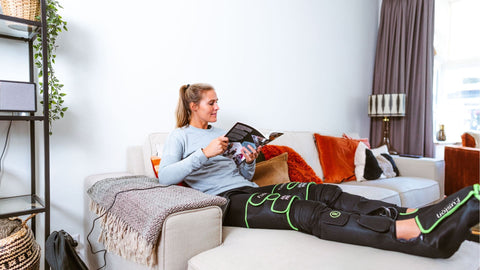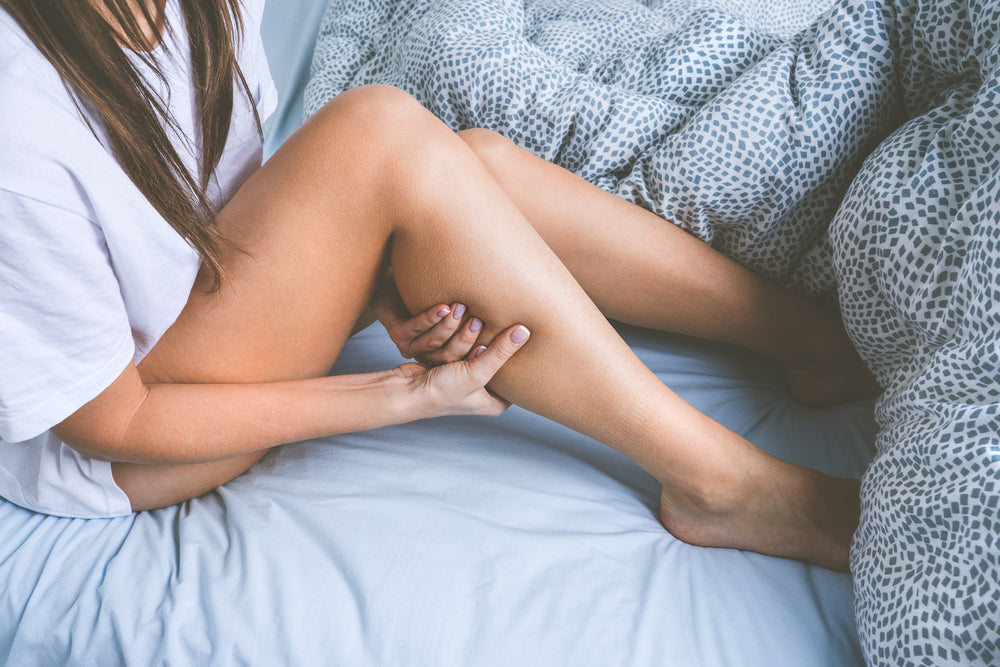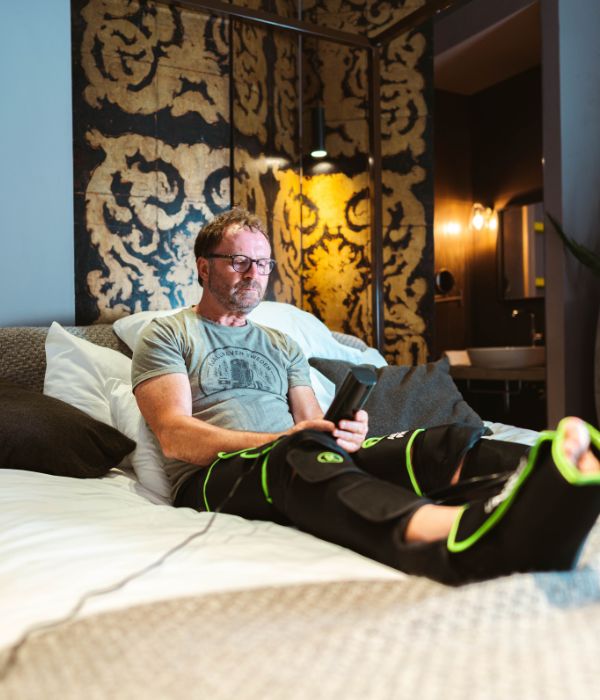Are you having trouble sleeping due to painful episodes of leg discomfort at night?
Or maybe you’re a restless sleeper who wakes up frequently due to leg pain.
If so, you aren’t alone.
Experiencing leg discomfort at night can be a frustrating and uncomfortable experience that can affect anyone's quality of life. This condition is common in people who stand for long periods of time during the day and others with a history of leg injuries and medical conditions.
While the causes can vary from person to person, the good news is that there are several things you can do to help ease leg discomfort and get the restful sleep you need.
So just what should you do to help relieve leg discomfort for a better night's rest? Are there safe and effective treatments you can try without any side effects in the long run?
Read on to discover just that in this short but informative guide. You'll learn about simple lifestyle changes you can make to prevent leg discomfort in the long run.
Let's dive in!
Effective Ways to Alleviate Leg Discomfort at Night
With a wide range of potential causes, leg discomfort can be difficult to treat. However, there are some strategies you can try that may help relieve the pain and improve your sleep quality.
Here are just a few suggestions:
Stretch your legs to improve blood circulation
While putting your legs through their paces before bed may sound or feel counterintuitive, it can actually be beneficial in helping you sleep better at night.
A major reason why people experience leg cramps at night is poor circulation or reduced blood flow.
With poor blood flow, leg muscles get deprived of oxygen and other nutrients, leading to painful cramps or muscle spasms.
Doing some simple stretching can help improve circulation and bring relief from leg pain. More blood flow means more nutrients and oxygen are sent to your cramped muscles for faster healing .
A few simple stretches that can help relieve leg discomfort include hamstring stretches, quadriceps stretches, and calf stretches. Also, aim to move your ankles in circles in both directions for several minutes.
This way, your blood vessels will open up and more blood will flow to the area, giving your muscles the necessary nutrients they need.
Soak up in warm water to loosen stiff joints and relieve achy muscles
Another easy way to reduce the discomfort of leg pain is by soaking in warm water.
Heat is a great way to relax your muscles, soothe any aches and pains, and help you get a better night's rest. The warmth also helps, which can reduce the stiffness associated with nocturnal leg cramps or spasms.
Soaking in warm water can be done in a bathtub, a foot bath, or even a bucket if you don’t have access to a tub to apply heat. If the idea of soaking up water just before bed doesn't appeal to you, you can also try using a heating pad or hot water bottle to give your leg muscles some relief.
Just ensure they aren't too hot—otherwise, it can have the opposite effect of making the pain worse.
Use a massage gun to relieve muscle tension and knots
When you experience leg discomfort, it can be due to tight muscles or knots in your lower body muscles.
In this case, using a massage gun may be able to help.
Massage guns help work out any tension in your muscles by releasing rapid pulses of pressure that reach deep into the tissue. This can help to loosen up any knots and improve circulation throughout the leg muscles.
It's important to note that many massage guns can be quite noisy, so you may want to opt for one that is quieter if you are sharing a room with someone.
Models like the Fusion Mini massage gun are specially designed with noiseless technology, making it easier to use without disturbing anyone else in the room. Just ensure that you choose an intensity level that works best for you and your comfort level.
Ease inflammation with an ice pack or cold compress
Did you know that inflammation of muscles is one of the main causes of leg discomfort?
Well, now you do.
Inflammation can be caused by a range of things, including intense workout sessions, overexertion, or joint problems.
When our leg muscles become inflamed, it can cause them to cramp and feel tight during the night. To help reduce inflammation and ease the pain, try applying an ice pack or cold compress to the affected area for 10–15 minutes before bedtime.
This simple strategy can help reduce swelling, relax your muscles, and give you some much-needed relief. Now you can sleep peacefully without any nighttime leg pain.
Use a leg massager to improve sleep quality

How do you like the idea of having your own personal masseuse?
A leg massager can give you the same feeling without breaking the bank.
Using a leg massager for just a few minutes each day can help reduce tension in your legs, promote blood flow, and ease any cramping or stiffness.
Leg massagers are also proven to be effective in helping you on the path to recovery from health conditions that make you more prone to experiencing leg cramps at night. This can include common conditions like sciatica, restless leg syndrome, arthritis, or varicose veins.
When shopping for a leg massager, ensure to choose one that provides the features you need for effective relief. Modern leg massagers like the Air C Pro come with adjustable settings as well as massage intensities—so you can customize the experience to your preference.
This way, you can target the right areas and find some relief from your leg discomfort.
Wear compression stockings to reduce discomfort and swelling
For people dealing with circulation issues, wearing compression stockings can be a great way to relieve leg discomfort at night.
Compression stockings work by using pressure therapy to improve blood flow and reduce swelling. Not only does this help to reduce intense pain caused by cramps or spasms, but it also helps you get better sleep at night.
Compression stockings come in a range of sizes and styles, so you can find one that's perfect for your needs. They can be worn all day or just before bedtime—whichever works best for you.
Consider natural or medical sleep aids
If your leg discomfort is keeping you from getting the sleep you need, natural sleep aids may be a good option.
There are several natural and medical options available that can help you drift off into a peaceful and restful sleep.
Natural sleep aids, such as melatonin or magnesium supplements, can help calm your body and relax your muscles, which can help reduce any leg discomfort. Alternatively, some medical restless sleep aids, such as prescription or over-the-counter medications, may be able to provide temporary relief from leg pain.
When used correctly, these drugs can help you get the restful sleep you need to feel better during the day.
These are just some of the ways you can ease leg discomfort at night.
Whether you decide to use a massage gun, cold compress, leg massager, compression stockings, or sleep aids—these methods can help you get the relief you need. This way, you can go about your day feeling more comfortable and in less severe pain.
But what if there was a way to avoid all these in the first place? Changes that may feel small, but can have a big impact on your overall health.
Let's take a close look at some of them in the next section.
Preventing Leg Discomfort at Night
While experiencing leg discomfort at night may seem unavoidable, there are several changes you can make to prevent it from occurring in the first place.
Here are some tips that can help you keep discomfort at bay:
Stay hydrated throughout the day
Staying hydrated throughout the day is important for your overall health and can also help you reduce leg discomfort like cramps at night.
When our leg muscles don't get enough water, they can become dehydrated and cramp up—causing muscle fatigue, joint pain and even nighttime leg cramps. That's why it's important to make sure you're drinking enough water throughout the day.
Aim to drink at least 8–9 glasses of water a day and avoid sugary or caffeinated drinks. This way, chances of experiencing leg discomfort are much lower when drinking plenty of water.
Maintaining a healthy weight
Just how much you weigh can also affect your overall health and cause leg discomfort.
Excess weight can put extra strain on your legs and increase the likelihood of experiencing pain when you sleep.
Imagine standing all day with extra weight on your legs—it doesn't sound very pleasant, does it?
That's why it's essential to keep your body weight in check, which is crucial for avoiding leg discomfort at night. This can be achieved through regular daily exercise and eating a nutritious, balanced diet.
Foods that are high in vitamins and minerals, such as fruits and vegetables, will help keep your body healthy and functioning properly.
Avoiding prolonged sitting or standing
A primary reason why people experience leg discomfort during sleep is due to prolonged sitting or standing.
When your body is in one position for too long, it can cause leg muscles like the calf muscles to become stiff and overworked—increasing the chances of experiencing cramps and spasms at night.
To prevent this from happening, aim to take regular breaks throughout the day and make sure you're doing some form of physical daily activity. Walking, jogging, or even yoga can help keep your muscles engaged and prevent them from becoming too stiff.
Wear comfortable and supportive shoes

Wearing comfortable and supportive shoes can be beneficial for avoiding leg discomfort at night.
Shoes that are too tight or ill-fitting can limit your mobility, causing pain and soreness in the feet, ankles, and legs. That's why it's important to invest in a pair of shoes that offer arch support, cushioning, and flexibility.
Shoes with adjustable straps or laces are also recommended, as they can be adjusted to provide a better fit.
Avoid caffeine and alcohol before bed
If you are one to always grab a cup of coffee or beer before going to bed, it's time to reconsider your habits.
Caffeine and alcohol are known to disrupt the body's natural sleep patterns, making it difficult to get a good night's rest. But did you know that they can also contribute to leg discomfort at night?
Caffeine is a stimulant that can increase alertness and energy levels—but this can come at the cost of muscle cramps and fatigue. Alcohol, on the other hand, has a tendency to dehydrate the body. This can cause your muscles to become stiff and sore during sleep—leading to leg discomfort.
Therefore, it's best to avoid caffeine and alcohol for at least four hours before going to bed. This way, you'll be able to get a restful night's sleep without any leg pain.
Sleep in a good position
Getting a good night's sleep is essential for avoiding leg discomfort at night, and the position you sleep in can make a world of difference.
Sleeping in the wrong position can put extra strain on your legs and cause them to become sore or cramp up. To get the most out of your sleep, try sleeping on your side with a pillow between your legs.
This will help to keep your spine in a neutral position and reduce the risk of leg discomfort. You can also try elevating your feet slightly with a few pillows.
This will help reduce pressure on your legs and promote better blood flow.
Frequently Asked Questions
Still got questions on how to deal with leg discomfort at night?
Here are the answers to some of the most commonly asked questions we receive from our community.
Why do I feel discomfort in my legs at night?
Many people experience discomfort in their legs at night due to a variety of reasons.
Poor posture, muscle fatigue from sitting or standing for too long, poor circulation, and dehydration are all common causes of leg discomfort at night. What's more, certain medical conditions such as restless leg syndrome, rheumatoid arthritis can cause pain and stiffness in the legs that can make it difficult to get a good night's rest.
Other factors that can contribute to leg discomfort at night include sleeping in an awkward position or wearing ill-fitting or uncomfortable shoes.
What are common symptoms of leg discomfort night?
Common symptoms of leg discomfort at night include cramping, stiffness, pain, and soreness in the legs or feet.
Pain can range from a dull ache to a sharp stabbing sensation that can make it difficult to move or sleep. Muscle cramps and spasms are also common, often occurring in the calf muscles or thighs. These can be painful and cause temporary immobility. Stiffness can also occur, making it difficult to move your legs without feeling achy or sore.
These symptoms may be more severe when you are sleeping on your side or in a position that doesn’t provide support for your legs. In addition to physical symptoms, some people experience emotional symptoms such as anxiety or insomnia.
How long does it take for leg discomfort to go away?
The amount of time it takes for signs of leg discomfort to go away varies depending on the severity, cause, and treatment method you go for.
For example, if your leg discomfort is caused by muscle fatigue or poor posture, then you should be able to see some relief relatively quickly after using treatments like a leg massager, stretching, or changing your shoes.
However, if your leg discomfort is caused by a medical condition, it may take longer for remedies to provide relief.
When should I seek medical attention for leg discomfort at night?
If your leg discomfort is persistent and does not improve with home remedies, it's important to seek medical treatment.
This is particularly the case if you experience any of the following common symptoms: swelling in your legs, warm or red skin around the area of pain, fever, and severe or worsening pain. These can be signs of a more serious medical condition, such as vein issues like deep vein thrombosis or varicose veins.
Your healthcare provider can provide further evaluation and treatment options to help reduce your leg discomfort.
Conclusion
Dealing with leg discomfort at night can be a frustrating experience.
Whether you're dealing with muscle fatigue, poor posture, or a medical condition, there are several things you can do to get relief.
This includes stretching your sore muscles, using a leg massager, soaking up warm water, wearing compression socks, or using an ice compress.
If your leg discomfort persists despite trying home remedies, it's important to contact a medical professional for further evaluation and treatment options.
While finding the best solution for your leg discomfort can seem like a challenge, there are steps you can take to prevent it from occurring in the first place. Getting adequate rest, staying properly hydrated, wearing comfortable shoes, and using good posture throughout the day can all help reduce your risk of experiencing leg discomfort at night.
Other ways to prevent leg discomfort include maintaining a healthy weight and avoiding prolonged sitting or standing.
By avoiding or reducing the sources of leg discomfort, you can help ensure that your nights are restful and pain-free. Feel free to reach out to us if you have any other questions.




